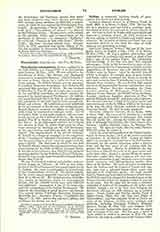

Pichler, a renowned Austrian family of gem-cutters who lived and died in Italy.
ANTONIO (JOHANN ANTON) b. at Brixen, Tyrol, April 12, 1697; d. in Rome, September 14, 1779. He was the son of a physician and had been a merchant until, traveling in Italy, he resolved to devote himself to art. He went to work in Naples with a goldsmith and engraver of precious stones. In 1743, proficient in his new calling, he moved to Rome and copied many antiques. He attained excellence and fame, but was somewhat limited in his field for want of early training and grounding in design.
GIOVANNI (JOHANN ANTON), the son of the foregoing, was b. at Naples, January 1, 1734; d. in Rome, January 25, 1791. He was a painter, gem-cutter, and experimenter in encaustic and mosaic, a pupil of his father, and of the painter Corvi. His scholarship and knowledge of the fine arts gave him unusual advantages. Early in life he executed a series of historical paintings for the Franciscans at Orioli, and the Augustinians at Braccian; also a St. Michael for the Pauline nuns in Rome. Later he devoted himself wholly to intaglio; he wrought gems of great beauty and finish, which resembled the classic so closely in style and execution that Winckelmann is said to have thought them antiques. He was held in high regard and received innumerable honors and lucrative commissions. Works: Hercules strangling the Lion; Leander crossing the Hellespont; Nemesis, Leda, Galatea, Venus, Dancers, the Vestal Tuccia, Arethusa, Ariadne, Antinous, Sappho; portraits of Pius VI and the Emperor Joseph II; and many other subjects. His son Giacomo was trained to be a gem-cutter and executed many works in Milan, whither he had gone to be near his sister Theresa, married to the poet Vincenzo Monti. He died in early manhood.
GIUSEPPE (JOHANN JOSEPH), b. in Rome, 1760; d. there, 1820. He was a son of Antonio by a second marriage and half brother to Giovanni, who taught him the family art. Among his works are the portrait of Alexander I of Russia; the Three Graces of ter Canova; Achilles, Bacchus, Ceres, Io, Medusa, Perseus etc. He signs in Greek, like the older Pichlers IIIXAEP, using the initial 4.
Luigi, the most distinguished of the Pichler family, was b. in Rome January 31, 1773, of the second marriage of Antonio; d. March 13, 1854. Losing his father while very young, he was indebted to his half-brother, Giovanni, for his careful education under a private tutor and for four years of art training with the painter De Angelis. Almost in childhood the boy had taken to himself the tools of the gem-cutter and, as he grew older, showed a special liking for cameo. Giovanni taught him their common art, and connoisseurs esteem that Luigi’s incisions have even more finish, clearness, and light-gathering quality than those of his brother. He received many commissions from the Vatican and the Courts of France and Austria, and kept a splendid house where music and masques were frequently given. He made several trips to Vienna and was asked to found a school there. In 1818 he copied in enamel five hundred gems of the Vienna Cabinet which the emperor wished to present to the pope. For the same city he made a complete collection of copies of the intaglios of his father and brother, adding a set of his own, thus bringing the historical collection of 1400 antiques up to modern times. Venus, Cupid and Psyche, Apollo, Head of Julius Caesar, Mars, Iris, the Day and Night of Thorwaldsen; and two exquisite heads of Christ are some of his subjects; besides many originals and portraits, including Giovanni Pichler’s, Winckelmann’s, Joseph II, Pius VII, and Gregory XVI. Luigi received innumerable honors from the popes and sovereigns of his day. His last gem, a head of Ajax, which he wished to present to Pius IX, was placed by the pope in a gold case in the Vatican collection with the signature II. A or IIIXAEP. A. The tomb of the Pichlers is in S. Lorenzo in Lucina, Rome.
M. L. HANDLEY

